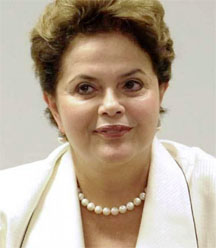BRASILIA (Reuters) – Brazil’s leftist President Dilma Rousseff will try to convince the world’s business elite in Davos this week that her country is still a good investment despite three years of mediocre growth.

The one-time Marxist guerrilla has decided to reach out to the rich and powerful for the first time at the annual World Economic Forum in the Swiss ski resort of Davos to reassure them she is business-friendly and not fiscally profligate.
That is a big turnaround for a leader with a reputation for heavy-handed policies that have squeezed profits of some companies and hurt share prices. Dispelling skepticism about Brazil’s future will be an uphill task as Rousseff plans to seek re-election in October.
“She will try to convince the international business community that she is more pragmatic than ideological, but no one really expects her government to make a huge effort to balance its fiscal policy in an election year,” said Ricardo Ribeiro, a political analyst at MCM consultancy in Sao Paulo.
The once-booming Brazilian economy grew just 1 per cent in 2012, and capital outflows last year were the highest since 2002. Public spending is rising steadily and tax revenues have slowed due to weak growth and tax breaks aimed at stimulating industries, raising the risk of a credit downgrade this year.
Brazil is no longer the darling of Wall Street it was during the commodity-fuelled expansion enjoyed by Rousseff’s predecessor and mentor, Luiz Inacio Lula da Silva, who, unlike Rousseff, was a regular fixture at Davos.
Business leaders blame Rousseff for cooling investor appetite for Brazil with her penchant for excessive government interference in the economy. Some “creative” accounting measures taken to meet savings targets also undermined the standing of her economic team, but Rousseff has resisted calls to replace Finance Minister Guido Mantega.





